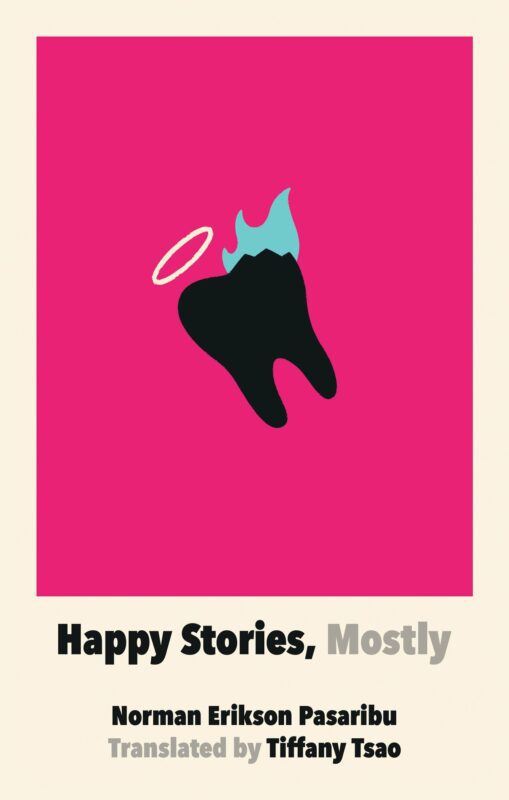
As noted by translator Tiffany Tsao, a closer translation of this book’s title would be “Happy Stories, Almost All of Them,” with “almost” being the crux of the matter. As such, this short story collection is an aggregation of almosts, of threads coming together but failing to form a tapestry, of things being close to happiness and acceptance but never quite there. All of this heartbreak is rendered tender through Pasaribu’s delicate yet playful storytelling, as well as Tiffany Tsao’s thoughtful translation. It is no surprise that this resonating collection found itself in the longlist of the International Booker Prize in 2022.
The stories center mostly on the lives of the Batak people in different parts of Indonesia, and how they, carrying with them the legacy of colonialism and their Christian faith, come to interact with queer identities. Pasaribu explores the often gradual and painful shifts in different people’s worldviews, from those who are exploring their sexual identity to those who are watching their loved ones go through this process. Each has to make up their own mind and come to terms with identity in their own ways, at their own pace, often out of step with each other. This underlying sense of incoordination, the perpetually out-of-sync relationships between the characters, adds on to the central theme of being “almost happy.”
This theme is captured early on in the collection with “A Bedtime Story for Your Long Sleep,” a surrealist story thrice told—the first two times to the narrator’s different potential employers, and then to us readers—about a man who slept for fifty years and missed his date with someone who could have been the love of his life. It is the throbbing heart of “The True Story of the Story of the Giant,” which in fact is a story of two friends fascinated by the same allegedly true tale of a giant man in North Sumatra—two friends who loved each other in different ways, at different times. It is poignantly felt in “Metaxu: Jakarta, 2038” through the reminiscence of a woman over her time working in a karaoke house and living with her brother after their father’s death, the two of them sharing a space but not a similar experience of grief. Pasaribu embraces metafiction in these shorts—his narrators let us know upfront that they are telling us a story—as if to declare that storytelling is precious and important, that it makes up such a big part of the way we process loss, pain, and grief.

Happy Stories, Mostly also regularly explores one’s relationship with faith, even—or rather, especially—when God seems absent, when faith seems to lead to nothing other than disappointment. One of my personal favorites, “Welcome to the Department of Unanswered Prayers,” takes readers on a trip to a nether world where one becomes part of a Christian corporation, and thereby demonstrates in a comical yet powerful and poignant way how, while many of us pour our hearts into believing, much of life is out of our control.
For me, Pasaribu’s writing strikes in the quieter sentences, the ones that don’t necessarily have the gravitas of flourishing language (to which Pasaribu, as a poet, is no stranger). It is the small, ordinary observations no different from the ones that we have in our everyday life—the ones that the story has been meticulously building up to—which stop me in my track. In “Ad Maiorem Dei Gloriam,” a story about Tula, a retired nun, finding company and love from a pair of father and son she once bumped into on one of her sneaky trips out of her convent, Tula is caught reflecting: “It’s good to be strong, Mbak Nani had once told her. But it’s even more important to accept yourself as you are now.” Tula has devoted her life to God, yet here she was, lonely in a convent full of other quiet nuns, seeking the warmth of familial love, grieving the life she had given up in order to follow her faith. The hurt of her dilemma is so succinctly yet powerfully wrapped up in that moment, with that line.
Parasibu boldly takes different approaches to storytelling, from metafictional to slice-of-life, from realist to surrealist. Their stories effuse an impressive and contagious sense of empathy, which makes Happy Stories, Mostly a beautiful and mostly heartwarming book to read. (In the few instances that it wasn’t heartwarming, it was because the story was heartbreaking). This collection, like the karaoke house in “Metaxu: Jakarta, 2038,” makes space for everything: “Slow songs, old songs, all the songs that never got played—we’d sing them to keep them on rotation, so they wouldn’t get erased.”
Happy Stories, Mostly
by Norman Erikson Pasaribu
translated by Tiffany Tsao
Feminist Press
 Thảo Tô is a writer from Vietnam. Her writing can be found in Sine Theta Magazine, diaCRITICS, The Augment Review, and elsewhere.
Thảo Tô is a writer from Vietnam. Her writing can be found in Sine Theta Magazine, diaCRITICS, The Augment Review, and elsewhere.


